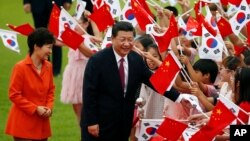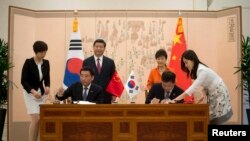China and South Korea agreed to expand economic ties and reaffirmed their commitment to a denuclearized Korean peninsula, as Chinese President Xi Jinping began a state visit to Seoul.
At a joint news briefing with Xi, South Korean President Park Geun-hye said Seoul and Beijing will work to complete a long-negotiated free trade agreement by the end of this year.
Seoul's finance ministry also said the two sides agreed to introduce direct trading between the South Korean won and the Chinese yuan, a measure that will expand the use of China's currency.
The decision means the yuan joins the dollar as the only currency directly convertible with the won.
Park also said she agreed with Xi that the Korean peninsula should be denuclearized and that the two leaders "resolutely" oppose further nuclear tests by North Korea.
"Above all, in the current situation, where North Korea once again launched its missile and maintained its stance of carrying out simultaneous development of its nuclear capability and economy, President Xi's visit to South Korea will be a clear message for North Korea's denuclearization, and peace and stability in the Korean Peninsula," Park said.
Xi's visit is expected to be dominated by concerns over North Korea's nuclear and ballistic missile programs. The trip is seen by many as a snub to North Korea, Beijing's historical ally.
In the past week, the North has fired several short-range rockets off its east coast, in what some view as a sign Pyongyang is unhappy with Xi's visit.
His trip marks the first time a Chinese president has visited South Korea before North Korea and the fifth time Park and Xi have met since they took office.
Xi has not yet met North Korean leader Kim Jong Un, who took power in 2011.
Kang Jun-young, a professor at Seoul's Hankuk University of Foreign Studies, told VOA the trip is also an opportunity for China to bring South Korea closer into its sphere of influence and thereby alienate Japan.
If China is to resist the United States’ rebalancing policy in Asia, he said, it must “curb Japan – if China can work with South Korea, which is a victim of Japan’s imperialism.
“Of course, South Korea must keep amicable relations with China,” Kang added, “but we also cannot go too much to China’s side because … of an alliance among South Korea, the United States and Japan."
Before the trip, China's Communist Party-run Global Times hailed South Korea as an "exemplar of good neighbor relations." The editorial said ties have been "particularly thriving" amid what it called an "intricate and complex" situation in Northeast Asia.
South Korea, along with its allies in Washington, have been pushing China to apply more pressure on North Korea to abandon its pursuit of nuclear weapons.
In recent years, Beijing has gone along with expanded U.N. sanctions against the North. But it has been reluctant to publicly make any statements that would upset Pyongyang, instead calling for the whole Korean peninsula to be denuclearized.
VOA Seoul bureau producer Youmi Kim contributed to this report.
Xi Jinping visits Seoul






